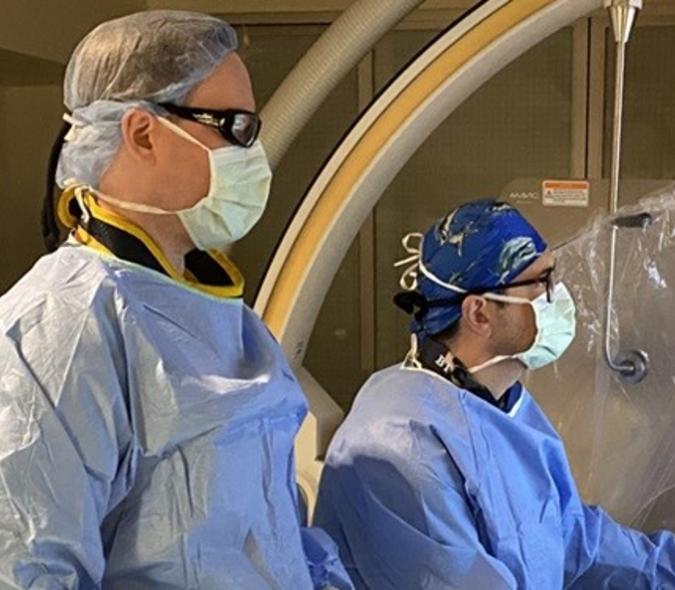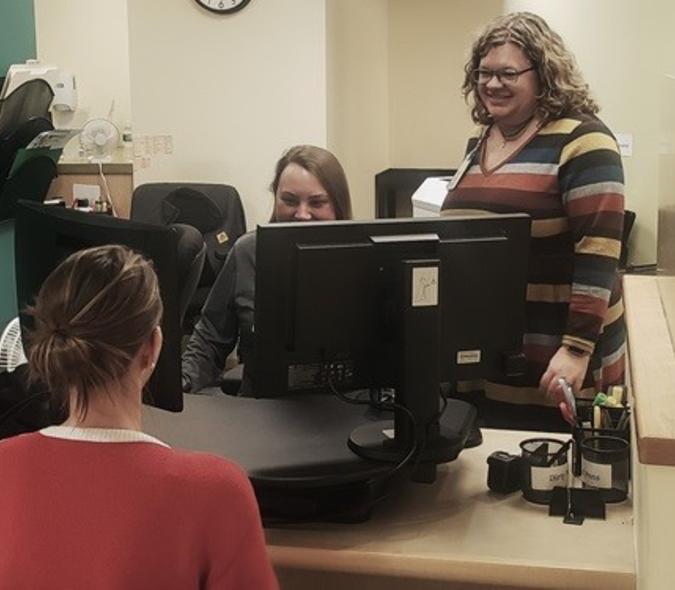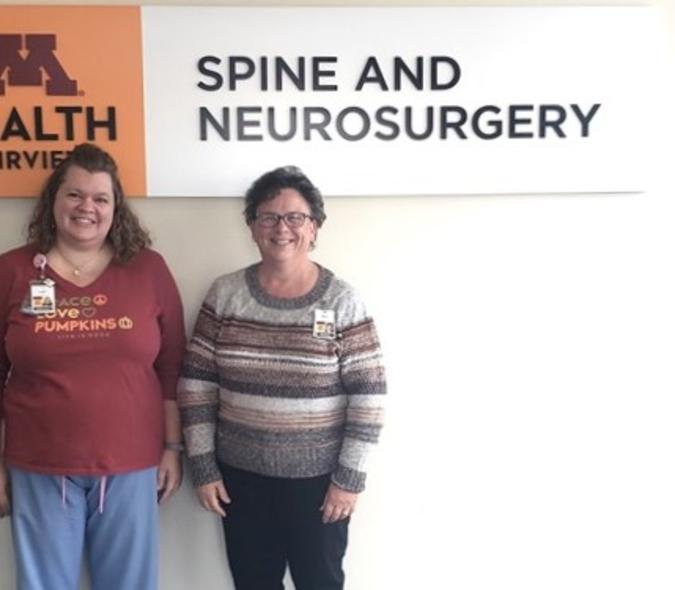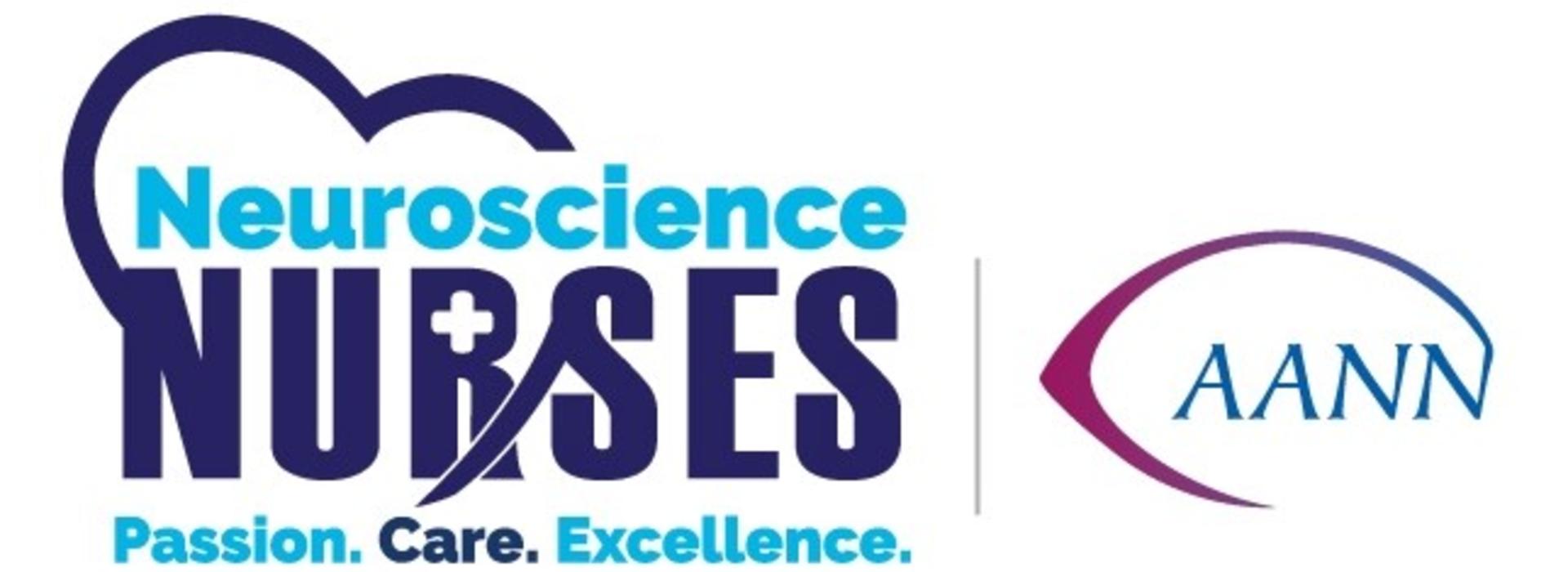
Neuroscience nurses find working with their patients – and their care teams – rewarding and stimulating
(The American Association of Neuroscience Nurses honors the dedicated efforts of nurses whose work focuses on the brain during 2020’s Neuroscience Nurses Week, May 12-18. This story spotlights and salutes three of our neuroscience nurses.)
Nurses who work with neurosurgical patients at the University of Minnesota Medical Center (UMMC) in Minneapolis care deeply about many things – their patients, their profession, and their love of learning. This profile looks at what Nurse Practitioners Suzie Shane and Sarah Heinle and Registered Nurse Mary Speake find so rewarding about being a neuroscience nurse.
Loving what they do
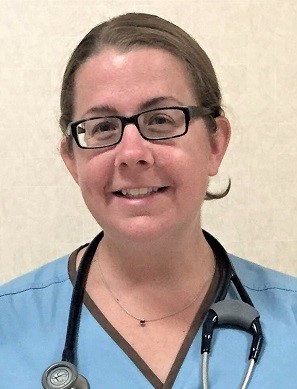
There are common themes to why these nurses love what they do. Some include the challenge of problem solving complex cases or the fact that each patient teaches them something new. Often, it’s something even more fundamental. “The trust you build with your patients is so important,” explained Speake (pictured at left). “They’re relying on you for emotional support and trusting you to pick up on any changes. It’s incredibly rewarding.”
That doesn’t mean there aren’t challenges. “When patients are confused or cognitively affected, it can be hard to establish a connection with them,” said Shane. “In that case, you must build rapport with the family, helping them understand what’s happening with their loved one. That can be challenging, too, especially right now with COVID-19 restrictions and families not being able to be at the bedside.”
Speake noted the challenge of staying centered and attentive. “You must be patient and calm to be able to communicate with our patients,” she said. “You need to be able to think critically and watch for subtle neurological changes because they can be a sign of something devastating.”
Heinle also enjoys being part of an excellent nursing team at UMMC and working with the neurosurgical residents to treat patients’ medical and neurological conditions. “We work with amazing and talented neurosurgeons,” she added. “It’s an honor to help facilitate their efforts on behalf of our patients.”
Building strong foundations
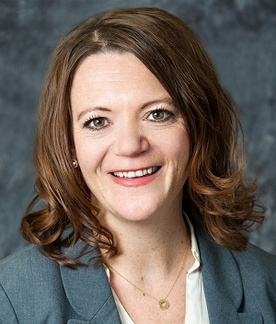
After completing nursing school and graduate school in North Dakota, Heinle (pictured at left) began working in primary care. “That gave me a good foundation for managing medical problems,” she said. “Then I worked in a NeuroICU, which helped me manage neurologic issues.” After earning a BA in psychology and biology at Hamline University in St. Paul, MN, Speake thought that nursing would be a good complement to her educational background. While attending nursing school at the University, she was a nursing assistant on UMMC’s neuroscience unit. She then became a floor nurse and for the past two-plus years, has been the nurse unit lead. In addition, Speake and five other Neuroscience Unit RNs recently earned Certified Neuroscience Registered Nurse (CNRN®) and Stroke Certified Registered Nurse (SCRN®) certification, which has inspired others to begin the process.
Shane, who completed a four-year Master’s program in nursing and is certified as a Neuroscience Registered Nurse, is taking an important next step. “To get a PhD in nursing has always been a goal of mine,” she said. “During one of my first days of nursing school, a professor said, ‘My job is to nurse you through the process of becoming a nurse.’ I want to be that person for people coming up in the nursing profession.”
Exploring new frontiers
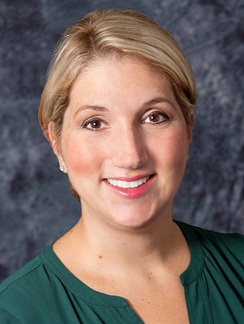
Shane (pictured at left) will complete her PhD program at the University, which enables her to conduct her own research. “My research proposal involves the use of EMDR [Eye Movement Desensitization and Reprocessing], a special type of therapy developed in the ‘80s that has been shown to be effective with patients who have PTSD or chronic pain syndromes, such as fibromyalgia, migraine or phantom limb. I want to see if we can use this therapy to treat patients who have chronic pain following spinal fusion.”
The therapy requires a bilateral stimulus of some kind, such as having the patient follow a finger back and forth or listening to a bilateral auditory stimulus. “As you’re applying the stimulus, you talk with the patient, helping them reprocess painful thoughts into more productive thought patterns,” explained Shane. “When they go back into their memories about the surgery or traumatic experience, they reintegrate them into a more positive pattern, which enables them to move past the painful symptoms. It hasn’t been used in a neurosurgical population, so I’m curious to see if the therapy can help patients get off postoperative pain meds more quickly.”
For those interested in neuroscience nursing…
All three nurses agreed that on-the-job training is key to becoming a good neuroscience nurse. “We don’t typically learn high-end anatomy and physiology in nursing school,” Heinle said. “You learn what you need to know to be competent while on the job.” Shane noted that her three years at the U have been critical to her development as a neuroscience nurse practitioner. “We see such a wide variety of patients,” she said.
Speake pointed out that many people feel uncomfortable about caring for neurosurgical patients. “They’re afraid they will miss something, so they avoid it,” she said. “When you become confident in your neurological exam and feel able to ask other department members questions about concerns, it’s incredibly rewarding. You just need to get over the hump of being afraid of it.”
To help introduce nurses to neuroscience, the UMMC Medical Surgery department hosts interns from the U of M and St. Catherine University in St. Paul, MN. The interns spend a summer with a nurse on the neuroscience unit and earn credit while doing so. “We hired a couple of nurses from that program,” said Speake. “It’s a great way to tell if you like neuroscience. You work with someone for so long that you can get over any fear of being good at what you do.”
For more information about the 2021 Summer Nurse Internship Program (the 2020 program was cancelled due to COVID-19 concerns), contact Tanya Velishek at tvelish1@fairview.org.
